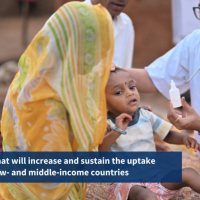
What is the aim of this review?
The aim of this Cochrane Review was to evaluate the effect of different strategies to increase the number of children in low‐ and middle‐income countries who are vaccinated to prevent infection by a disease. Researchers in Cochrane collected and analysed all relevant studies to answer this question and found 41 relevant studies.
Do strategies to improve childhood vaccination work?
Millions of children in low‐ and middle‐income countries still die from diseases that could have been prevented with vaccines, partly because the number of children that are vaccinated in this setting is still low. Governments and others have tried different strategies to increase the number of children vaccinated.
What was studied in the review?
We reviewed all interventions that aimed at improving vaccine uptake by children under the age of five years. These included interventions that target the caregivers (parents/guardians), care providers, the community, the health system, or a combination of any of these.
What are the main results of the review?
The review authors found 41 relevant studies from Afghanistan, China, Côte d'Ivoire, Ethiopia, Georgia, Ghana, Guatemala, Honduras, India, Indonesia, Kenya, Mali, Mexico, Nepal, Nicaragua, Nigeria, Pakistan, Rwanda, and Zimbabwe. These studies included 100,747 participants. They compared people receiving these strategies to people who only received the usual healthcare services. The studies showed the following.
‐ Immunisation outreach alone or in combination with non‐monetary incentives or health education probably improves full vaccination uptake among children under five years of age.
‐ Health education may lead to more children receiving three doses of diphtheria‐tetanus‐pertussis containing vaccine (DTP3).
‐ The use of specially designed immunisation cards may improve the uptake of DTP3.
‐ Using phone call or text messages to remind caregivers about vaccination may have little or no effect on improving uptake of DTP3.
‐ Involvement of community leaders in combination with health provider intervention probably improves uptake of DTP3.
‐ We are uncertain if training of health providers on interpersonal communication skills improves the uptake of DTP3.
What are the limitations of the evidence?
Our confidence in the evidence for the interventions studied ranged from moderate to very low, implying that the results of further research could differ from the results of this review. The main reasons for our reduced confidence in the evidence are that in some of the studies people were not randomly placed into different intervention groups. This means that differences between the groups could be due to differences between people rather than between the interventions. For some interventions, the results were very inconsistent across the different studies and for some only one study was available, or the intervention had few people studied.
How up‐to‐date is this review?
The review authors searched for studies that were published up to July 2022.
Read the full review
